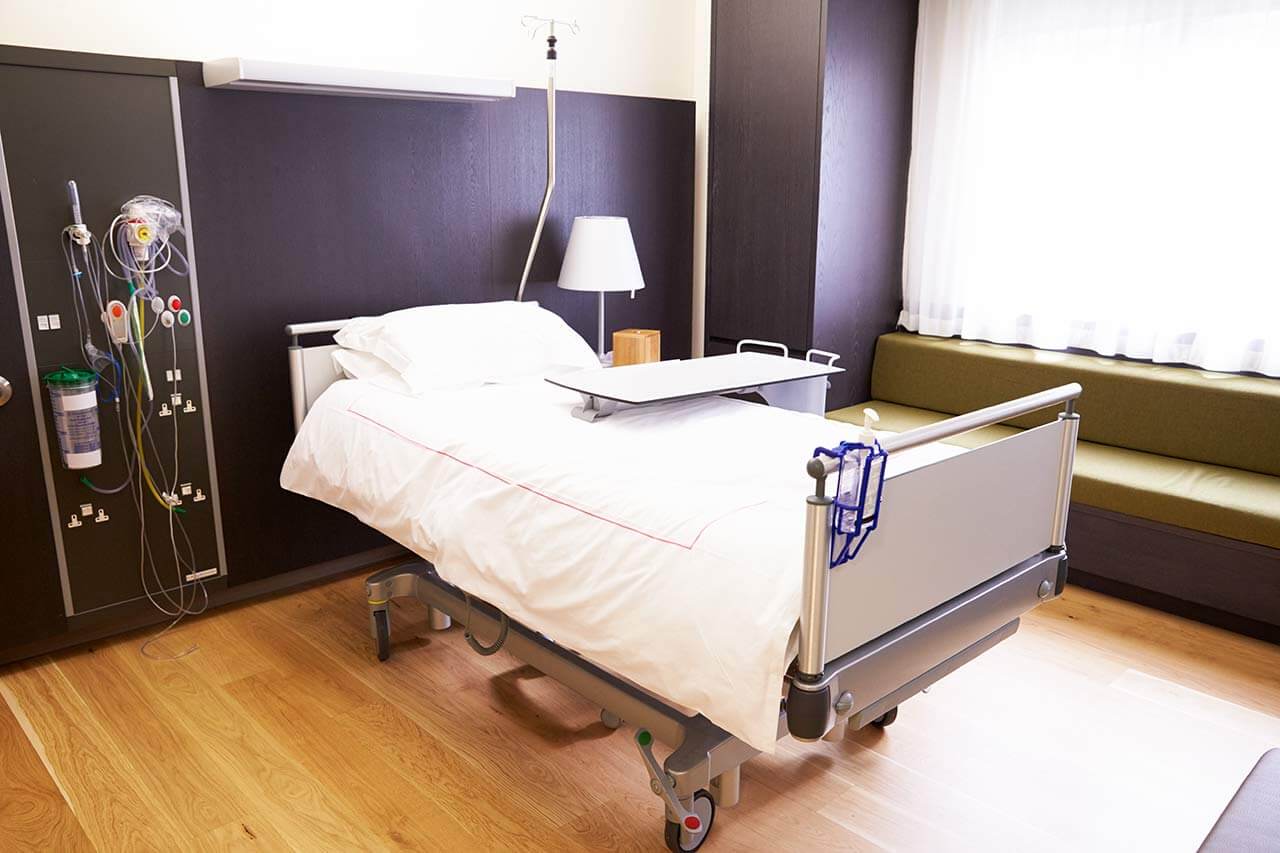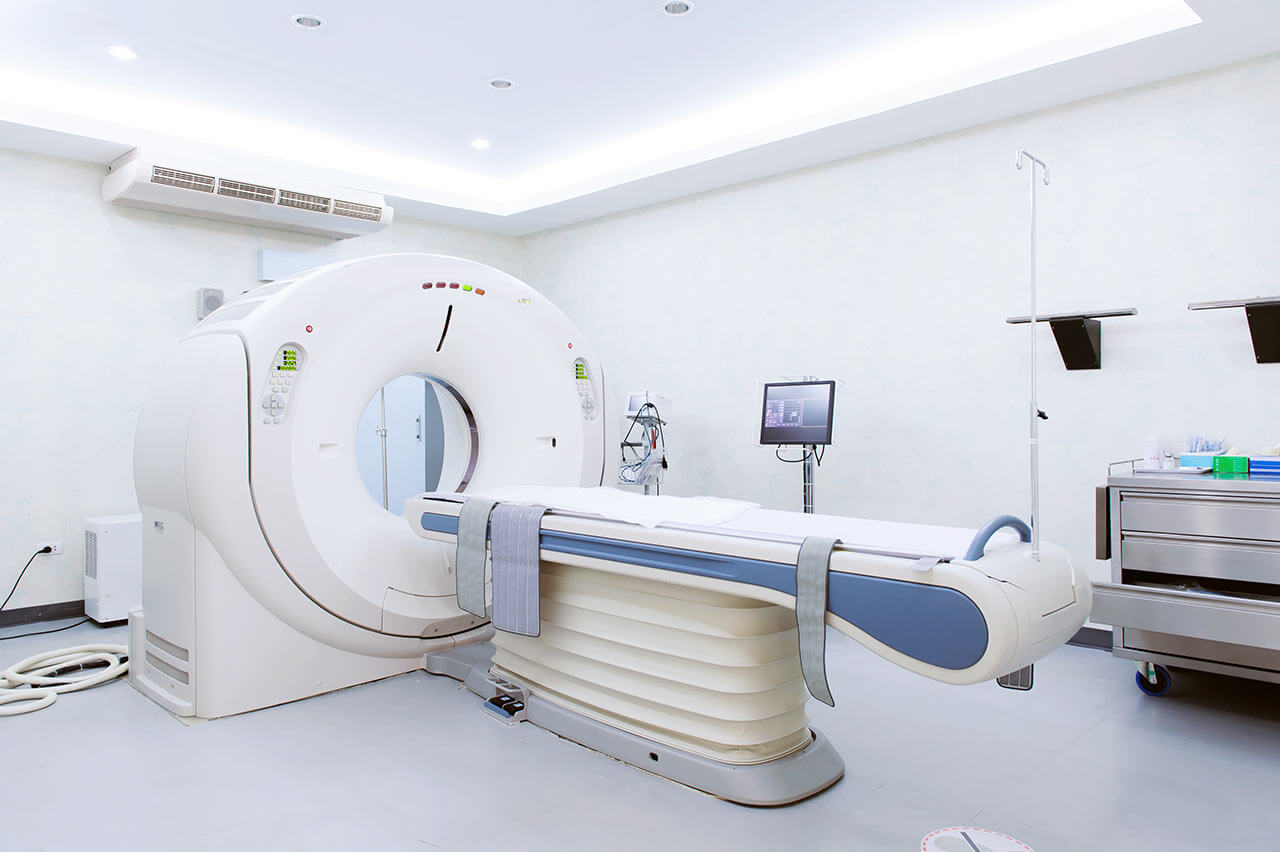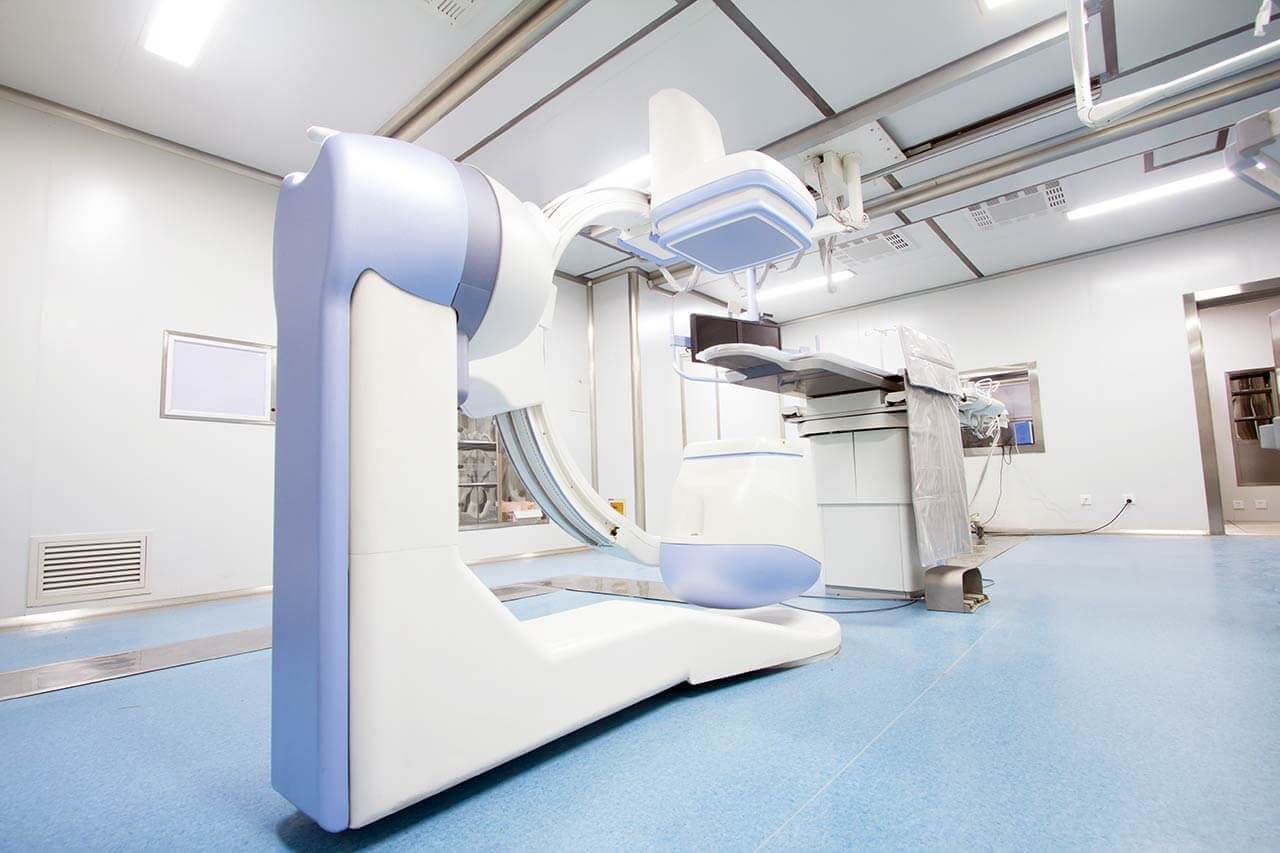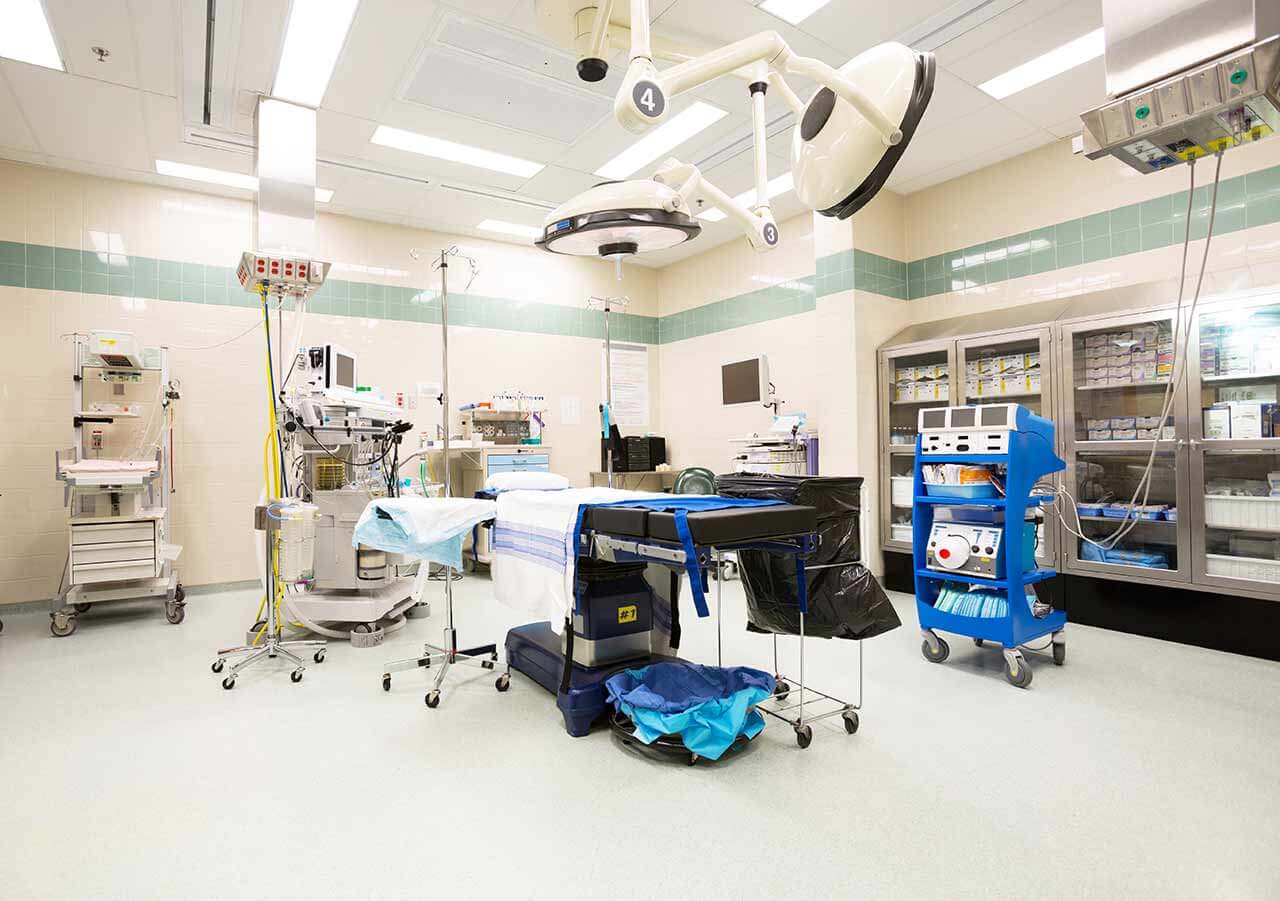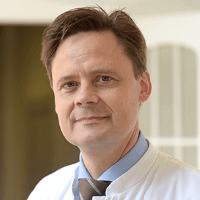
The program includes:
- Initial presentation in the clinic
- clinical history taking
- review of medical records
- physical examination
- laboratory tests:
- complete blood count
- biochemical blood test
- inflammation markers (CRP, ESR)
- blood coagulation analysis (aPTT, PT, INR)
- neurological examination
- functional X-ray
- electrophysiology study (if indicated clinically)
- CT/MRI scan
(if indicated clinically, additional cost is 650/1200€) - differential diagnosis with other neurological diseases
- nursing services
- consultation of related specialists
- treatment by chief physician and all leading experts
- explanation of individual treatment plan
Required documents
- Medical records
- X-ray examination, MRI/CT scan (if available)
Service
You may also book:
 BookingHealth Price from:
BookingHealth Price from:
About the department
The Department of Neurology and Epileptology at the Charite University Hospital Berlin offers a full range of diagnostics and conservative treatment of diseases of the central and peripheral nervous system. The focus is on patients with stroke and other cerebrovascular diseases, multiple sclerosis, Parkinson's disease, tremor, neuropathies, muscle diseases, epilepsy, chronic headaches, and facial pain. The medical facility also provides consultations for patients with rare and particularly complex neurological disorders such as amyotrophic lateral sclerosis, myasthenia gravis, encephalitis, and others. The department annually treats more than 8,000 inpatients, for whom 170 beds are provided. More than 20,000 patients a year receive qualified medical care in the specialized outpatient clinics of the department. The healthcare facility has excellent diagnostic capabilities for examining the brain and spinal cord and anatomical structures of the peripheral nervous system: there are specialized facilities for electroneurography, electromyography, evoked potential recording, electroencephalography, duplex sonography, Dopplerography, computed tomography, magnetic resonance imaging, and other tests. As for the treatment, patients are offered effective drug therapy regimens, physiotherapy, exercise therapy, massage, electrical stimulation, botulinum toxin therapy, and other therapeutic measures. The department's physicians approach the choice of treatment tactics with the utmost responsibility, strictly following the current clinical protocols and recommendations of the German Neurological Society (DGN). The Head Physician of the department is Prof. Dr. med. Matthias Endres.
The department's team of neurologists treats patients with multiple sclerosis on a daily basis. The medical facility is certified by the German Multiple Sclerosis Society (DMSG), which confirms the high level of specialization in this field. Multiple sclerosis is a chronic disease in which the immune system attacks the nerve cells in the brain and spinal cord. The main symptoms include muscle weakness, dizziness, loss of coordination, unsteady gait, vision problems, and decreased sensitivity. The disease is more common in women and usually develops between the ages of 20 and 40. To diagnose multiple sclerosis, specialists use magnetic resonance imaging and analysis of cerebrospinal fluid obtained by lumbar puncture. In some cases, additional tests, such as electroneuromyography and evoked potential recording, may be required. Treatment is based on comprehensive drug therapy. Patients are prescribed immunosuppressive and hormonal medications, immunomodulators, muscle relaxants, as well as pain relievers and emotional correction agents. The drug treatment is supplemented by physiotherapy, massage, and specially selected physical exercises to maintain physical activity. Today, multiple sclerosis is considered an incurable disease, but modern treatment methods make it possible to effectively control its course. The main goal of therapy is to relieve symptoms, slow down the progression of the disease, and maintain a high quality of life. The department's physicians have extensive experience in the treatment of multiple sclerosis and have a full range of state-of-the-art equipment and therapeutic approaches to provide quality medical care to patients with this diagnosis.
The department is also one of the leading medical centers in Germany for the treatment of movement disorders associated with dysfunction of the nervous system. Experienced neurologists provide comprehensive medical care for patients with Parkinson's disease, atypical parkinsonism, dystonia, tremor, and rare movement disorders caused by metabolic or genetic reasons. The department's specialists most commonly treat Parkinson's disease, a degenerative brain disorder manifested by resting tremors, stiffness and slowness of movement, changes in gait, and balance disorders. The therapeutic process begins with a comprehensive evaluation, including a medical history, neurological examination, blood tests, DaTSCAN (a special type of brain scintigraphy to detect dopamine deficiency), and levodopa testing. In addition, MRI, PET, SPECT, cerebrospinal fluid analysis, ultrasound, and neuropsychological testing may be needed. Since Parkinson's disease is currently incurable, therapy is aimed at relieving symptoms and improving quality of life. The basis of treatment is drug therapy with medications that increase dopamine levels in the brain, which helps reduce tremors and improve motor function. In addition, patients are prescribed physiotherapy, occupational therapy, therapeutic exercise, and speech therapy. Lifestyle changes play an important role in the success of treatment: doctors recommend regular moderate physical activity, a healthy diet, and normalizing sleep patterns. In complex cases and in advanced stages of the disease, deep brain stimulation may be used. In this neurosurgical procedure, small electrodes are implanted that, by electrically stimulating certain areas of the brain, regulate the abnormal activity that causes the symptoms of the disease.
The clinic has also earned a high reputation among German neurology centers for the treatment of epilepsy. This chronic condition is caused by increased activity of individual nerve cells in the brain. The main manifestation of the disease is epileptic seizures, which are accompanied by tremors, convulsions, and loss of consciousness. For diagnosis, doctors conduct a neurological examination, the main method of which is electroencephalography, a study of the electrical activity of the brain. When prescribing treatment, specialists try to stop epileptic seizures or reduce their frequency, depending on the characteristics of a specific clinical case. For this purpose, modern antiepileptic drugs are used. Specialists select the most appropriate drug or combination of drugs, taking into account the type of seizures, their frequency and intensity, the age and general condition of the patient. Treatment usually begins with a minimal dose of medication, which is gradually increased until a therapeutic effect is achieved. Although a complete cure for epilepsy is impossible, properly selected therapy allows physicians to control the disease and provide the patient with a high quality of life. In some cases, neurosurgical intervention may be necessary. For example, in focal epilepsy, removal of the source of pathological activity can completely relieve the patient of seizures.
The main areas the department specializes in include the following:
- Diagnostics and treatment of multiple sclerosis
- Diagnostics and treatment of movement disorders
- Diagnostics and treatment of Parkinson's disease
- Diagnostics and treatment of atypical parkinsonian syndromes
- Diagnostics and treatment of tremor
- Diagnostics and treatment of dystonia
- Diagnostics and treatment of rare movement disorders caused by metabolic disorders
- Diagnostics and treatment of rare genetic movement disorders
- Diagnostics and treatment of epilepsy and other convulsive syndromes
- Diagnostics and treatment of neurovascular diseases
- Diagnostics and treatment of ischemic stroke
- Diagnostics and treatment of hemorrhagic stroke
- Diagnostics and treatment of subarachnoid hemorrhage
- Diagnostics and treatment of cerebral venous thrombosis
- Diagnostics and treatment of inflammatory cerebrovascular diseases (vasculitis)
- Diagnostics and treatment of chronic headaches: migraines, tension headaches, and cluster headaches
- Diagnostics and treatment of dementia
- Diagnostics and treatment of amyloidosis
- Diagnostics and treatment of amyotrophic lateral sclerosis
- Diagnostics and treatment of ataxia
- Diagnostics and treatment of encephalitis
- Diagnostics and treatment of myasthenia gravis
- Diagnostics and treatment of neuromuscular diseases
- Diagnostics and treatment of immune neuropathies
- Diagnostics and treatment of chronic inflammatory demyelinating polyneuropathy
- Diagnostics and treatment of multifocal motor neuropathy
- Diagnostics and treatment of rheumatic polyneuropathy (for example, polyneuropathy associated with systemic lupus erythematosus) or against the background of chronic inflammatory bowel disease
- Diagnostics and treatment of polyneuropathy in monoclonal gammopathy of undetermined significance
- Diagnostics and treatment of Guillain-Barre syndrome
- Diagnostics and treatment of muscle diseases
- Diagnostics and treatment of muscular dystrophy
- Diagnostics and treatment of myotonic dystrophy
- Diagnostics and treatment of myositis
- Diagnostics and treatment of metabolic and toxic myopathies
- Diagnostics and treatment of immune neuropathies
- Diagnostics and treatment of neuroAIDS and neurological disorders caused by HIV infection
- Diagnostics and treatment of HIV-associated neurocognitive deficits: forgetfulness, difficulty concentrating, and impaired fine motor skills
- Diagnostics and treatment of HIV-associated neuropathy: sensory disturbances, tingling and pain, usually beginning in the toes and feet and gradually worsening over several weeks
- Diagnostics and treatment of HIV-associated myelopathy: sensory disturbances and paralysis of the legs, bladder and rectal dysfunction
- Diagnostics and treatment of HIV-associated myopathy: muscle pain, muscle weakness, and muscle loss
- Diagnostics and treatment of neurological complications of antiretroviral therapy: emotional disorders, forgetfulness, difficulty concentrating, muscle pain and muscle weakness
- Diagnostics and treatment of progressive multifocal leukoencephalopathy
- Diagnostics and treatment of sleep disorders of neurological genesis
- Diagnostics and treatment of sleep problems (for example, sleepwalking)
- Diagnostics and treatment of parasomnias, sleep-related seizures, and other sleep-related movement disorders
- Diagnostics and treatment of narcolepsy with and without cataplexy and other disorders associated with excessive daytime sleepiness
- Diagnostics and treatment of restless legs syndrome
- Diagnostics and treatment of sleep-wake cycle disorders
- Diagnostics and treatment of neurological disorders caused by oncological diseases and their treatment
- Diagnostics and treatment of other neurological disorders
The range of diagnostic and therapeutic services provided by the department includes the following:
- Diagnostic services
- Functional diagnostics of the peripheral nervous system
- Classical electroneurography
- Classical electromyography
- Evoked potential registration: motor, visual, acoustic, and somatosensory evoked potentials
- Motor and sensory neurography using F-waves
- Needle electromyography with quantitative analysis of evoked potentials
- Neuromuscular junction testing
- Electromyography of individual muscle fibers
- Reflex testing, including brainstem reflexes
- Small nerve fiber function testing, such as sympathetic skin response
- Electroencephalography
- Classical electroencephalography
- Sleep deprived electroencephalography
- Ultrasound diagnostics of the vessels of the neck and brain
- Extra- and intracranial duplex sonography of the arteries and veins
- Extra- and intracranial Doppler ultrasonography
- Cerebral perfusion, measurement of cerebral circulation time
- Transcranial sonography in B-mode
- Neuropsychological studies for the diagnosis of cognitive impairment
- Magnetic resonance imaging
- Functional diagnostics of the peripheral nervous system
- Therapeutic services
- Drug therapy: oral medications, infusions, and injections
- Electrical stimulation
- Botulinum toxin therapy
- Intra-arterial thrombolysis for acute ischemic stroke
- Physiotherapy
- Exercise therapy
- Massage
- Other diagnostic and treatment methods
Curriculum vitae
Higher Education and Professional Career
- Since 2009 Medical Director, Charite Center 15 for Neurology, Neurosurgery and Psychiatry, Charite University Hospital Berlin.
- Since 2008 Head Physician, Department of Neurology and Epileptology, Charite University Hospital Berlin.
- Since 2008 W3 Professorship, Charite University Hospital Berlin.
- 2005 - 2008 Lichtenberg Professorship for Interdisciplinary Stroke Research, Volkswagen Foundation, Hannover, Charite University Hospital Berlin.
- 2004 - 2007 Senior Physician, Department of Neurology and Epileptology, Charite University Hospital Berlin.
- 2003 - 2005 Heisenberg Fellowship, German Research Foundation (DFG).
- 2001 Habilitation, Charite University Hospital Berlin.
- 1998 - 2004 Head of the Cerebral Ischemia Research Group, Department of Experimental Neurology, Charite University Hospital Berlin.
- 1998 - 2003 Research Associate, Department of Neurology and Epileptology, Charite University Hospital Berlin.
- 1996 - 1998 Research Associate, Center for Neurology, Massachusetts General Hospital, Harvard Medical School, Boston.
- 1994 - 1996 Assistant Physician, Department of Neurology, University Hospital Luebeck.
- 1995 Doctoral dissertation, University of Hamburg.
- 1988 - 1994 Medical studies, Ruhr University Bochum and University of Hamburg.
Positions in Scientific Societies and Organizations
- 2009 - 2015 Board Member of the German Stroke Society (DSG).
- Since 2008 Board Member, Center for Stroke Research, Charite University Hospital Berlin.
- 2005 - 2009, 2013 - 2017 Board Member of the International Society for Cerebral Blood Flow and Metabolism (ISCBFM).
Awards and Honorary Memberships
- 2017 - 2022 Visiting Professorship, Oxford University, Great Britain.
- Since 2016 Member of the Leopoldina National Academy of Sciences.
- 2008 Heinrich Pett Award, German Neurological Society (DGN).
- 2002 Paul Martina Prize, Paul Martina Foundation, Berlin.
- 2000 Adolf Wallenberg Award, German Neurological Society (DGN).
- 1999 Niels Lassen Award, International Society for Cerebral Blood Flow and Metabolism (ISCBFM).
- 1999 Research Prize from the German Stroke Foundation.
- 1998 Oskar Lapp Research Award, German Cardiac Society (DGK).
Research Focuses
- Vascular mechanisms of stroke protection.
- Risk factors and prevention, degeneration and regeneration, as well as depression after a stroke.
Photo of the doctor: (c) Charité – Universitätsmedizin Berlin
About hospital
According to the reputable Focus magazine, the Charite University Hospital Berlin ranks 1st among the best healthcare facilities in Germany!
The hospital is one of the largest and leading university medical complexes in Europe, and also consistently holds leading positions in the international medical arena. The Charite operates on the basis of the Faculty of Medicine of the Free University of Berlin and the Humboldt University of Berlin. Patients are offered modern diagnostics and treatment with the very latest methods, many of which were developed by professors and scientists of the medical complex. More than half of all German Nobel Prize winners in medicine and physiology, such as Emil von Behring, Robert Koch, and Paul Ehrlich, studied and worked at the Charite University Hospital Berlin. The medical complex includes more than 100 specialized departments and institutes, which helps to ensure that patients receive care in all existing medical specialties. The hospital has exceptional experience in treating complex clinical cases.
Each year, the hospital treats more than 137,800 inpatients and more than 787,700 outpatients. The hospital has a bed capacity of 3,293 beds. A huge medical team consisting of 5,670 scientists and doctors and more than 6,000 nurses work for the benefit of the patients. The main task of all specialists of the medical facility is to restore the patient's health or save his life in critical cases. The hospital has a friendly atmosphere where every patient feels care, respect and empathy.
The Charite University Hospital Berlin is generously funded by the German government, which is why it offers patients the latest generation of excellent equipment and comfortable infrastructure. The Charite medical complex is equipped with da Vinci robotic surgery systems, laser technologies, equipment for endovascular catheter-based interventions, neuronavigation devices, intraoperative monitoring systems, equipment for proton therapy available only in the most advanced medical centers in the world, and many other technologies. All these resources, combined with the experience and professional skills of the hospital's doctors, are the key to providing the most effective and safe treatment in accordance with the highest international medical standards.
The hospital is recognized with a huge number of quality certificates, including DIN EN ISO 9001:2015, certificates from the German Cancer Society (DKG), the German Society for General and Visceral Surgery (DGAV), the German Society for Thoracic Surgery (DGT), the German Hernia Society (DHG), and the ERAS Society.
The Charite University Hospital Berlin is a benchmark in the European healthcare system. Patients therefore receive impeccable medical service, quality care, and personalized service that puts the patient and their individual needs first.
Photo: (с) depositphotos
Accommodation in hospital
Patients rooms
The patients of the Charite University Hospital Berlin live in comfortable rooms made of modern design. Each room is equipped with an ensuite bathroom with a toilet and a shower. The standard room furnishing includes an automatically adjustable bed, a bedside table, a wardrobe for storing clothes, a table and chairs for receiving visitors, and a TV. If desired, Wi-Fi access can be provided. The hospital also offers enhanced-comfort rooms.
Meals and Menus
The patient and his accompanying person have a daily choice of three menus. If for any reason, you do not like the food, you will be offered an individual menu. Please inform the medical staff about your dietary preferences before the treatment.
Further details
Standard rooms include:
Religion
Religious services are available upon request.
Accompanying person
During the inpatient program, an accompanying person may stay with you in a patient room or at the hotel of your choice.
Hotel
During the outpatient program, you can live at a hotel of your choice. Managers will help you to choose the most suitable options.
The hospital offers a full range of laboratory tests (general, hormonal, tests for infections, antibodies, tumor markers, etc.), genetic tests, various modifications of ultrasound scans, CT scans, MRI and PET / CT, angiography, myelography, biopsy and other examinations. Treatment with medications, endoscopic and robotic operations, stereotaxic interventions is carried out here, modern types of radiation therapy are also used. The hospital offers patients all the necessary therapeutic techniques.
- Proton therapy
- CyberKnife treatment
- Hyperthermic intraperitoneal chemotherapy (HIPEC)
- PSMA therapy with Lutetium-177
- Joint replacement in adults and children
These are oncological diseases, benign neoplasms of the brain and spinal cord, heart valve defects, diabetes mellitus and its complications, joint diseases and other pathologies.
- Neurosurgery
- Oncology
- Plastic and reconstructive surgery
- Interventional radiology
- Proton therapy (Proton Therapy Center BerlinProtonen)
The medical team includes more than 4,225 highly qualified scientists and doctors.
